at TA = 25°C, VIN = 1.4 V or
VIN = VOUT(nom) + 0.3 V (whichever is greater),
VBIAS = open, VOUT(nom) = 0.8 V, VEN = 1.1 V,
CIN = 10 μF, COUT = 22 μF, CNR/SS = 0 nF,
CFF = 0 nF, and PG pin pulled up to VIN with 100 kΩ
(unless otherwise noted)
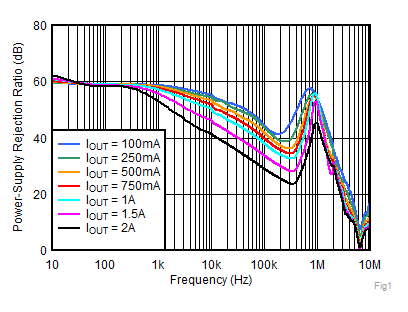
VIN = 1.1 V, VBIAS = 5 V,
COUT = 22 μF, CNR/SS = 10 nF,
CFF = 10
nF |
Figure 7-1 PSRR
vs Frequency and IOUT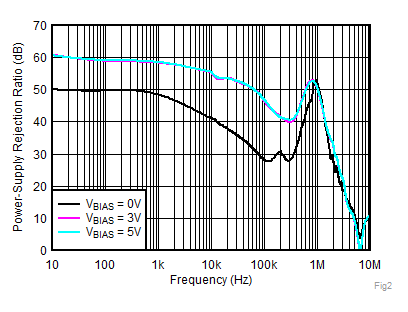
VIN = 1.4 V, IOUT = 1 A,
COUT = 22 μF, CNR/SS = 10 nF,
CFF = 10
nF |
Figure 7-3 PSRR
vs Frequency and VBIAS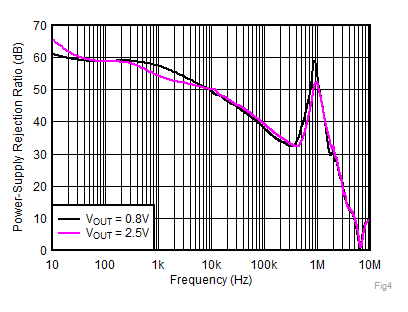
VIN = VOUT + 0.3 V,
VBIAS = 5 V, IOUT = 2 A,
COUT = 22 μF,
CNR/SS = 10 nF,
CFF = 10 nF |
Figure 7-5 PSRR
vs Frequency and VOUT With BIAS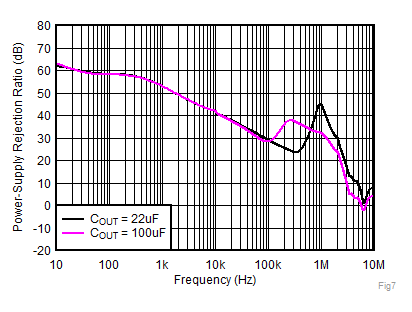
VIN = VOUT + 0.3 V,
VOUT = 1 V, VBIAS = 5 V,
IOUT = 2 A,
CNR/SS = 10 nF, CFF = 10
nF |
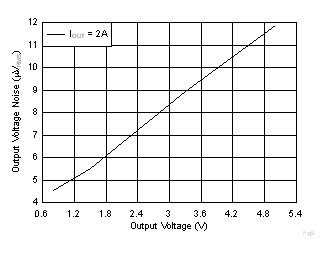
VIN = VOUT + 0.3 V and
VBIAS = 5 V for VOUT ≤ 2.2 V,
COUT = 22
μF, CBIAS = 10 μF, CNR/SS = 10 nF,
CFF = 10 nF, RMS noise BW = 10 Hz to 100
kHz |
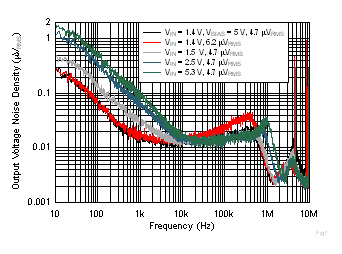
IOUT = 2 A, COUT = 22
μF, CNR/SS = 10 nF, CFF = 10 nF,
RMS noise BW = 10 Hz
to 100 kHz |
| |
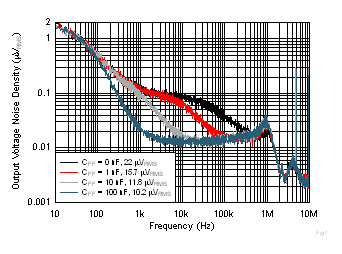
VIN = 5.3 V, VOUT = 5
V, VBIAS = 5 V, IOUT = 2 A,
COUT = 22 μF,
CBIAS = 10 μF,
CNR/SS = 10 nF,
RMS noise BW = 10 Hz to
100 kHz |
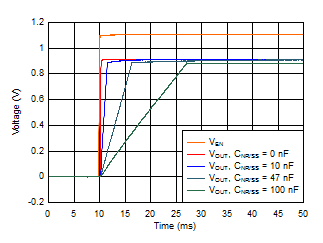
VIN = 1.2 V, VOUT =
0.9 V, VBIAS = 5 V, IOUT = 2 A,
COUT = 22
μF, CBIAS = 10 μF, CFF = 10
nF |
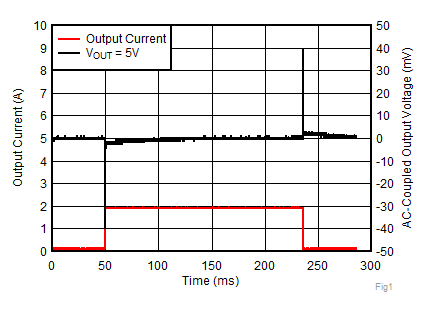
IOUT, DC = 100 mA,
COUT = 22 μF, CNR/SS =
CFF = 10 nF,
slew rate = 1 A/μs |
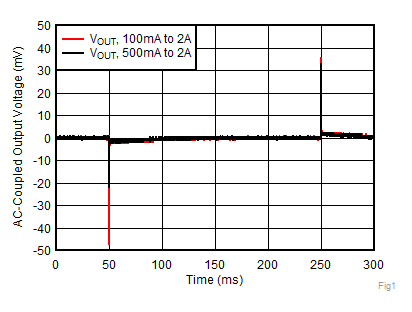
VIN = 5.3 V, VBIAS = 5 V,
COUT = 22 μF, CBIAS = 10 μF,
VOUT = 5 V,
CNR/SS = CFF = 10 nF, slew
rate = 1 A/μs |
Figure 7-19 Load
Transient vs Time and DC Load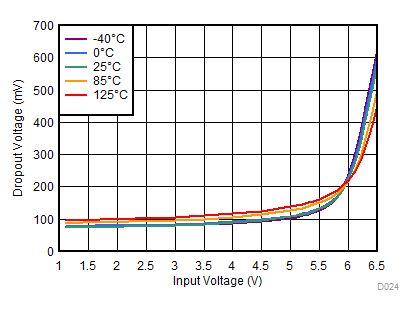
| IOUT = 2 A, VBIAS = 6.5
V |
Figure 7-21 Dropout Voltage vs Input Voltage With BIAS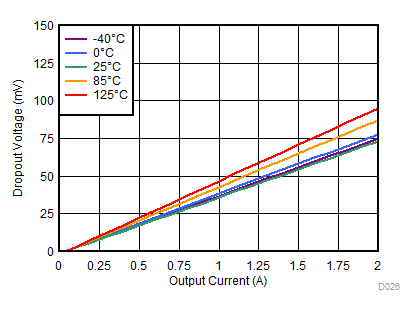 Figure 7-23 Dropout Voltage vs Output Current With BIAS
Figure 7-23 Dropout Voltage vs Output Current With BIAS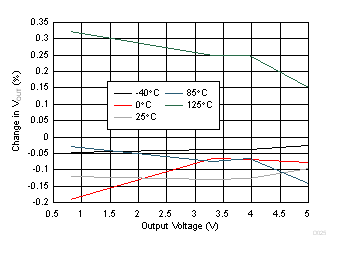 Figure 7-25 Load Regulation vs Output Voltage
Figure 7-25 Load Regulation vs Output Voltage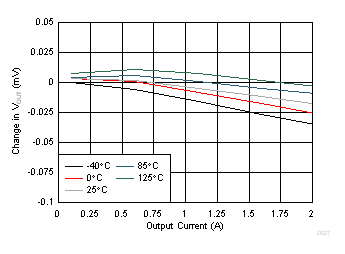 Figure 7-27 Load Regulation (3.3-V Output)
Figure 7-27 Load Regulation (3.3-V Output)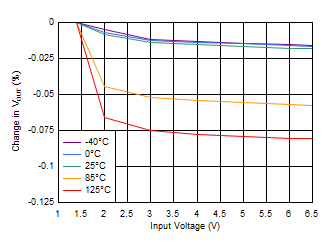
| VOUT = 0.8 V, IOUT = 5 mA |
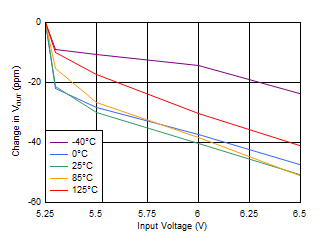 Figure 7-31 Line Regulation (5-V Output)
Figure 7-31 Line Regulation (5-V Output)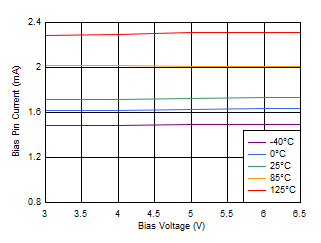 Figure 7-33 BIAS Pin Current vs Bias Voltage
Figure 7-33 BIAS Pin Current vs Bias Voltage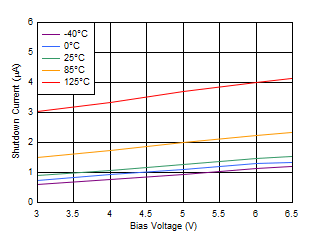 Figure 7-35 Shutdown Current vs Bias Voltage
Figure 7-35 Shutdown Current vs Bias Voltage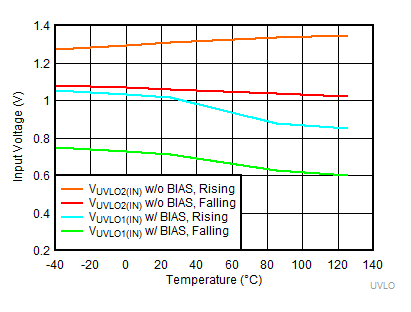 Figure 7-37 VIN UVLO vs Temperature
Figure 7-37 VIN UVLO vs Temperature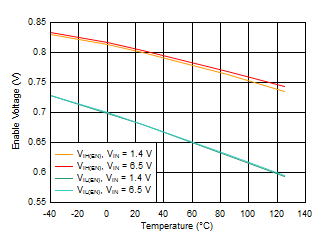 Figure 7-39 Enable Threshold vs Temperature
Figure 7-39 Enable Threshold vs Temperature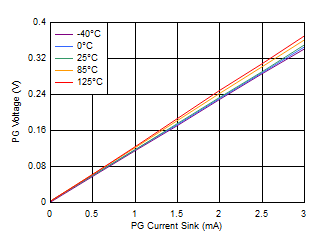 Figure 7-41 PG Voltage vs PG Current Sink
Figure 7-41 PG Voltage vs PG Current Sink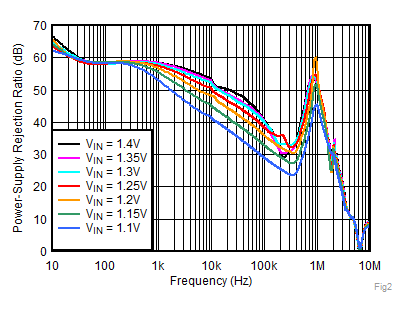
IOUT = 2 A, VBIAS = 5 V,
COUT = 22 μF, CNR/SS = 10 nF,
CFF = 10
nF |
Figure 7-2 PSRR
vs Frequency and VIN With BIAS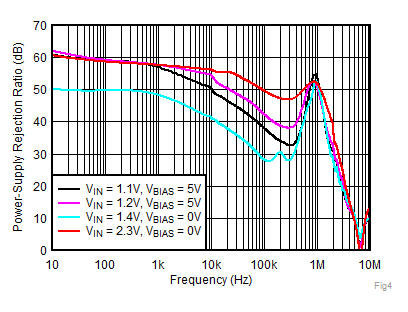
| IOUT = 1 A, COUT = 22 μF,
CNR/SS = 10 nF, CFF = 10
nF |
| |
Figure 7-4 PSRR
vs Frequency and VIN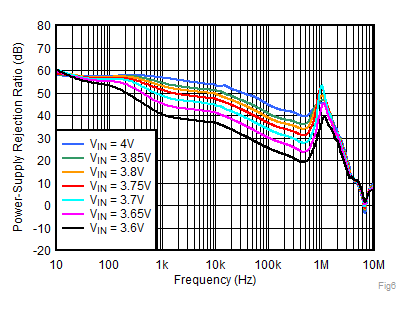
| IOUT = 2 A, COUT = 22 μF,
CNR/SS = 10 nF, CFF = 10
nF |
| |
Figure 7-6 PSRR
vs Frequency and VIN for VOUT = 3.3 V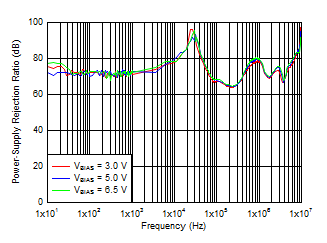
VIN = VOUT + 0.3 V,
VOUT = 1 V, IOUT = 2 A,
COUT = 47 μF ||
10 μF || 10 μF, CNR/SS = 10 nF,
CFF = 10 nF |
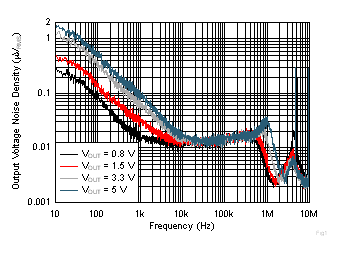
VIN = VOUT + 0.3 V and
VBIAS = 5 V for VOUT ≤ 2.2 V,
IOUT = 2 A,
COUT = 22 μF, CBIAS = 10 μF,
CNR/SS = 10 nF,
CFF = 10 nF,
RMS noise BW = 10 Hz to 100 kHz |
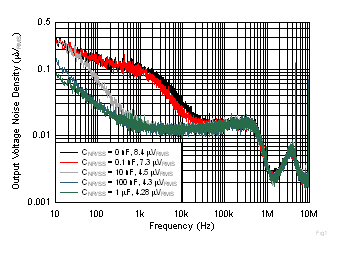
VIN = 1.1 V, VOUT =
0.8 V, VBIAS = 5 V, IOUT = 2 A,
COUT = 22
μF, CBIAS = 10 μF, CFF = 10 nF,
RMS noise BW = 10 Hz
to 100 kHz |
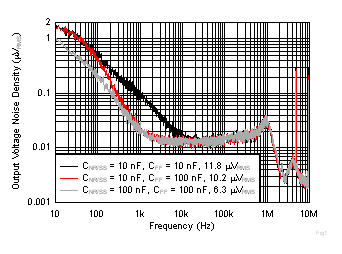
IOUT = 2 A, COUT = 22
μF, CFF = 10 nF,
RMS noise BW = 10 Hz to 100 kHz |
| |
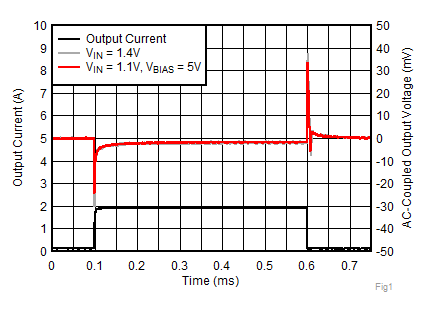
IOUT, DC = 100 mA, slew rate =
1 A/μs, CNR/SS = 10 nF,
COUT = 22 μF,
CBIAS = 10 μF |
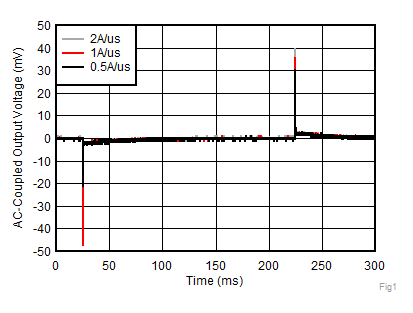
VOUT = 5 V, IOUT, DC =
100 mA, IOUT = 100 mA to 2 A,
COUT = 22 μF,
CNR/SS = CFF = 10 nF |
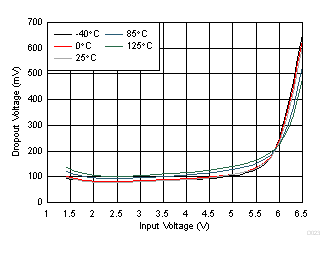 Figure 7-20 Dropout Voltage vs Input Voltage Without BIAS
Figure 7-20 Dropout Voltage vs Input Voltage Without BIAS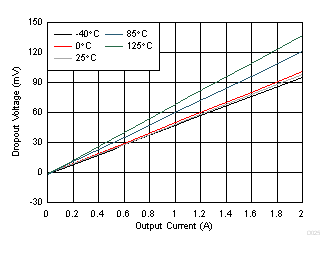 Figure 7-22 Dropout Voltage vs Output Current Without BIAS
Figure 7-22 Dropout Voltage vs Output Current Without BIAS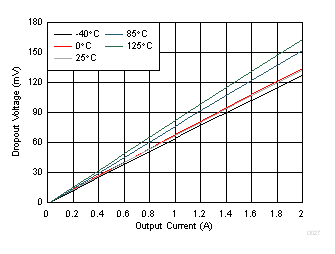 Figure 7-24 Dropout Voltage vs Output Current (High VIN)
Figure 7-24 Dropout Voltage vs Output Current (High VIN) Figure 7-26 Load Regulation
Figure 7-26 Load Regulation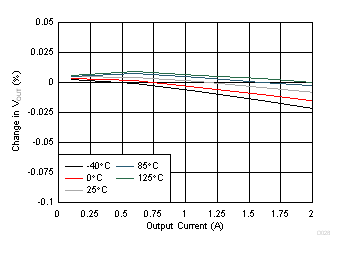 Figure 7-28 Load Regulation (5-V Output)
Figure 7-28 Load Regulation (5-V Output)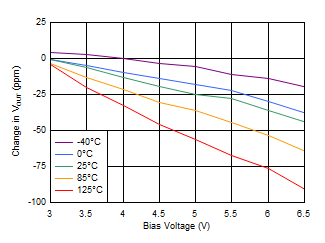
| VOUT = 0.8 V, VIN = 1.1 V, IOUT = 5 mA, VBIAS = 5 V |
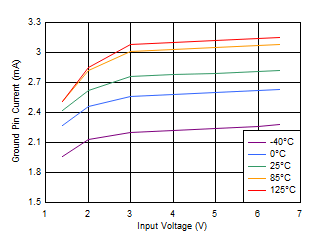 Figure 7-32 Ground Pin Current vs Input Voltage
Figure 7-32 Ground Pin Current vs Input Voltage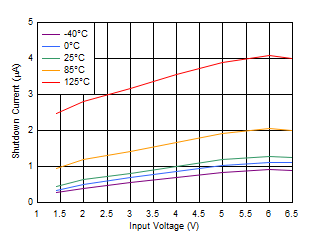 Figure 7-34 Shutdown Current vs Input Voltage
Figure 7-34 Shutdown Current vs Input Voltage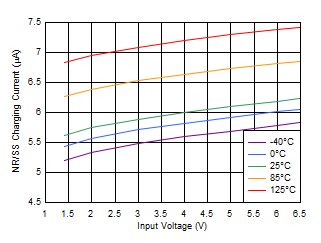 Figure 7-36 INR/SS Current vs Input Voltage
Figure 7-36 INR/SS Current vs Input Voltage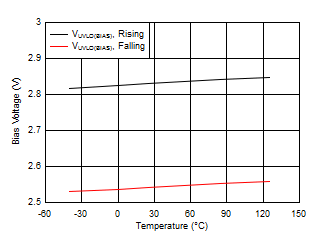 Figure 7-38 VBIAS UVLO vs Temperature
Figure 7-38 VBIAS UVLO vs Temperature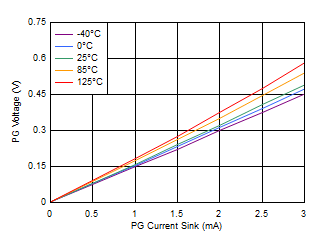 Figure 7-40 PG Voltage vs PG Current Sink
Figure 7-40 PG Voltage vs PG Current Sink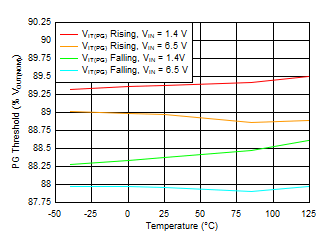 Figure 7-42 PG Threshold vs Temperature
Figure 7-42 PG Threshold vs Temperature








































